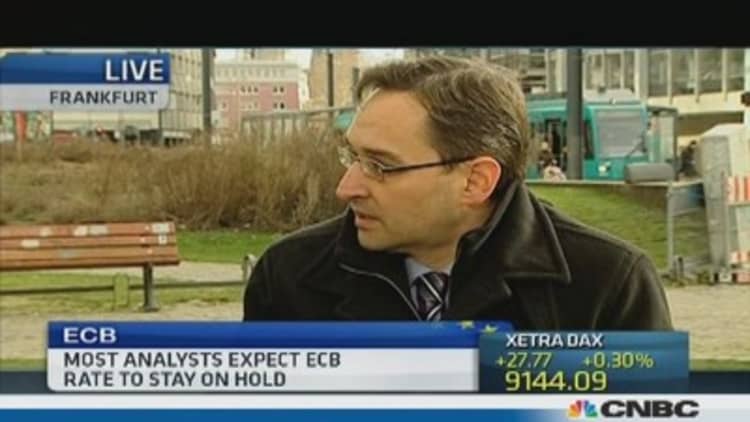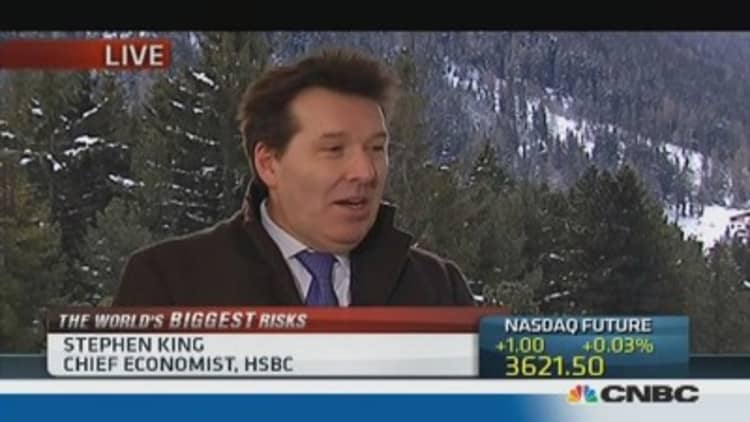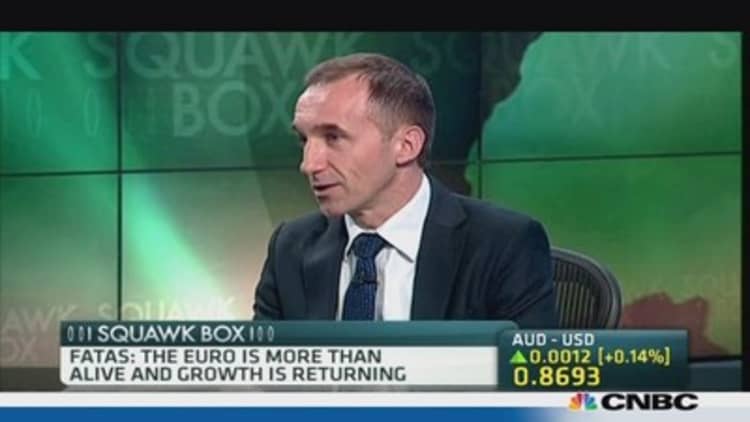
Yet another low inflation shock in the euro zone has upped the pressure on the European Central Bank (ECB) to act, with some economists arguing that a rate cut could be announced as soon as this week.
Concerns that the 18-nation currency bloc was headed for deflation were boosted further on Friday, when official data revealed that inflation fell to 0.7 percent in January – below the 0.9 percent expected by economists, and significantly lower than the ECB's 2 percent target.
The last time inflation came in at this level – in October, when inflation slid to a 47-month low – the bank cut its main interest rate to 0.25 percent from 0.5 percent in response.
(Read more: Deflation fears back: Euro zone inflation falls again)
As such, all eyes will be on ECB President Mario Draghi on Thursday following the central bank's policy meeting, with economists expecting him to act sooner rather than later.
"Persistently low inflation should trigger another ECB rate cut to keep deflationary risks at bay," Barclays' European economics team said in a note.
While falling prices are good news for consumers, they're bad for the economy. Deflation stunts demand as consumers hold off spending in the hope of further price declines. It can also cause increased unemployment and even lead to economic depression.
Japan, for instance, suffered what has becomes known as a "lost decade" to deflation, when companies cut their prices to revive lackluster demand, which in turn hit businesses' revenue and had a knock-on effect on the economy.
(Read more: Euro zone money supply dries up, pressuring Draghi)
"The ECB is aware that persistently low inflation prints risk negatively impacting medium-/long-term inflation expectations," Societe Generale's research team led by Patrick Legland said in a note.
"To limit this risk, the ECB needs to act sooner rather than later – like last November – though the data indicates any action will still be too little, too late."
Deutsche Bank economists Mark Wall and Giles Moec also expect action on Thursday, although they forecast it to take the form of a small negative deposit rate – which could boost lending by providing a disincentive for banks to leave money with the central bank.

"With an ECB keen to be ahead of the curve on inflation, we now expect the ECB to ease the policy again in February," they said in a note.
"Given the decline in excess reserves, a small negative deposit rate will have more signal content than direct stimulus. It would signal ECB willingness to adopt new non-standard policies."
Despite these concerns, however, economists are divided over whether Draghi will act on Thursday, or wait until the ECB's March meeting.
Recovery underway?
Carsten Brzeski, senior economist at ING, said developments over recent weeks had provided evidence both for monetary policy action (the inflation shock) and against it, with a number of economic indicators pointing towards a recovery scenario.

Markit's composite purchasing manager's index (PMI) released Wednesday, for instance, rose to 52.9 in January, up from 52.1 in December. It was, however, lower than the flash estimate of 53.2 (a reading over 50 marks expansion).
The uptick was driven by the manufacturing industry, where accelerating new orders and export business pushed the rate of expansion close to a three-year high.
(Read more: Euro zone business activity rises beyond expectations)
Meanwhile, jobless data released Friday showed that although the unemployment rate remained stuck at 12 percent in the euro zone, the number of people out of work fell by 129,000 in December.
As such, Brzeski said the balance was tipped towards no action this week, but added: "Since November last year, we know to take the ECB's determination to fight any deflationary threats seriously. It would be a mistake to underestimate the ECB's willingness for pre-emptive strikes."
Forecasts eyed
Despite some uncertainty about timing, however, economists are agreed that deflationary concerns have increased the pressure on the ECB and put its inflation forecasts in the spotlight.
Daiwa Capital Markets' Chris Scicluna and Emily Nicol argued that the ECB was likely to "temporarily refrain" from significantly revising their assessment of deflationary risks. This is because although the headline inflation rate declined in January, the drop was caused by lower energy prices and core inflation moved upwards as expected.
But they added: "While we think that the Governing Council is, on balance, just about more likely than not to leave policy unchanged next week, we also now think that it will have to follow through on its forward guidance and cut rates again in March."
Societe Generale's Legland agreed. "For now, the ECB remains in a wait-and-see mode. It is however likely that it will be forced to act – and this is only a question of time."
—By CNBC's Katrina Bishop.Follow her on Twitter @KatrinaBishop and Google


